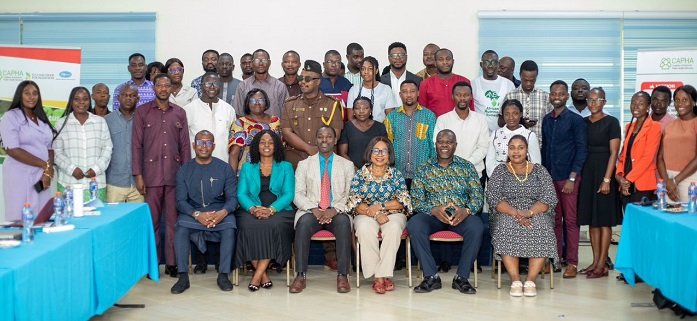News
2 children die of Malnutrition every hour

Two children in Ghana die from malnutrition-related causes every hour, Nutrition specialist and Lecturer at the University of Cape Coast, Dr Kasim Abdulai, has disclosed.
He said despite interventions over the years to address the health threat, it continues to threaten the lives of thousands of children, particularly during the first 1,000 days of life; from conception to a child’s third birthday.
“Just imagine how many children we lose in a day due to the triple burden of malnutrition in Ghana. Nothing is more important compared to nutrition during the first 1,000 days of a child’s life not even medication.
It is the nutrients that help to build the child’s immune system, their mental development, and physical growth and it is crucial that we pay needed attention to nutrition for maternal and child health,” Dr Abdulai who is also Director of Operations of the Coalition of Actors for Public Health Advocacy (CAPHA), stated.
He was presenting findings of a research on key nutrition situation, trends and funding gaps in Ghana during a capacity building workshop for selected journalists and civil society organisations focused on nutrition in Accra last Tuesday.
Organised by CAPHA in partnership with the Women, Media and Change (WOMEC) network, the training was to rally participants to champion nutrition interventions in Ghana to promote a healthier population and reduce disease burden.
Furthermore, Dr Abdulai said with 42 per cent of Ghanaian women of reproductive age being anaemic, wasting and stunting among children at 7 per cent and 18 per cent, respectively, the need to tackle root causes like good nutrition among the population couldn’t be more critical.
He called for urgent investment into nutrition, especially domestically, in view of dwindling donor aid saying; “Nutrition is not charity, it is a right. If we nourish our children today, we secure our nation’s future tomorrow.”
“Let’s not wait for another child to die before we act. We must act now because the cost of inaction is measured in lives lost every hour,” he urged.
Executive Director of WOMEC, Dr Charity Binka, decried the malnutrition burden in Ghana despite investments made into the area over the years.
She emphasised that the time was up to break the silence around malnutrition with deliberate efforts channeled into promoting exclusive breastfeeding, good complementary feeding, and hygienic food practices.
“We need to invest into our local foods to nourish our children and ensure nutrition is part of our everyday conversations right from our homes.
Fighting malnutrition is not just about saving lives. It’s about unlocking Ghana’s full potential. When we invest in nutrition, we invest in education, health, economic growth, and social progress,” she explained.
By Abigail Annoh
News
Prioritise affordable treatment of sickle cell treatment —Health Expert

Health experts have urged Ghana to prioritise affordable and accessible treatment for sickle cell disease (SCD) as advanced, but costly curative therapies remain out of reach.
SCD, an inherited blood disorder, affects about three in every 100 newborns in Ghana.
Globally, around 1,000 babies are born with the condition daily, with three-quarters in sub-Saharan Africa.
The disease causes severe complications including chronic pain, anaemia, infections, strokes and organ damage, often leading to shortened life expectancy.
In recent years, gene therapy has been developed as a potential cure.
However, its cost—running into millions of dollars per patient—makes it financially and technically inaccessible in Ghana.
According to Dr Lawrence Osei-Tutu, a Sickle Cell and Childhood Cancer Expert at the Komfo Anokye Teaching Hospital, “the country must instead focus on practical, lower-cost interventions such as hydroxyurea”, a decades-old cancer drug proven to reduce painful episodes, hospitalisation and life- threatening complications in SCD patients”.
Taken orally, the medicine improves red blood cell function and is considered safe and effective.
“Hydroxyurea therapy is as good as the cure and a low-hanging fruit to pluck, we must bring a cure to our sickle cell warriors, but do so sustainably.” he urged.
In a chat with The Spectator here, he said to create awareness on the disease, the expert noted that despite its benefits, “hydroxyurea is not widely accessible in Ghana.”
Stressing that, “many patients either cannot afford it or struggle with irregular supply through the health system.”
Moreover, he argued that scaling up access would provide immediate relief while the country builds the infrastructure, trains specialists and secures funding needed to support curative therapies in the future.
With an estimated 15,000 babies born with sickle cell disease annually in Ghana, Dr Osei Tutu cautioned that “failure to improve access to effective treatment will leave many patients vulnerable to preventable complications and early death.”
From Kingsley E. Hope, Kumasi
Join our WhatsApp Channel now!
https://whatsapp.com/channel/0029VbBElzjInlqHhl1aTU27
Hot!
Let’s reintroduce Cultural Studies to complement educational reforms — Tourism Minister

Madam Abla Dzifa Gomashie, the Minister of Tourism, Culture and Creative Arts, has emphasised the importance of reintroducing Cultural Studies in schools as part of Ghana’s broader educational reform agenda.
She said Cultural Studies would complement existing efforts to reposition Science, Technology, Engineering and Mathematics (STEM) and Technical Vocational Education and Training (TVET) to promote digital literacy and expand Creative Arts education.
Speaking at the 2025 Homowo Festival of the people of Ningo-Prampram, held on the theme: “Education: The Best Legacy for our Children,” Madam Gomashie said cultural education was critical to national identity and development.
She noted that the festival’s theme aligned with the Government’s vision to transform education in Ghana and encouraged the youth to embrace it not only as a means of personal development but also as a way of preserving traditional values.
These values, including patience, wisdom, and hard work, were at the core of the Homowo celebration, the Minister said.
“Cultural festivals like Homowo are vital instruments for strengthening cultural identity, preserving historical memory, and fostering national unity. Additionally, festivals serve as platforms for educating the youth through storytelling, music, dance, and other traditional practices, while also providing opportunities for community engagement.”
Madam Gomashie highlighted the strong foundation that Ghana’s tourism was built on, which included culture, traditions, and the creative industry, collectively contributing to over GH¢4.8 billion to the economy.
“Festivals give tourists reasons to visit our country. Therefore, with the right infrastructure and the development of all the domains, the sector can do more than what has been recorded,” she added.
Mr Sam Nartey George, the Member of Parliament for Ningo-Prampram and Minister of Communication, Digital Technology and Innovation, commended the community for their vibrant participation in the festival. He announced plans for the construction of a new nursing training school in Ningo, aimed at expanding access to healthcare education in the area.
Nene Osroagbo Djangmah XII, Paramount Chief of Great Ningo Traditional Area; King Dr Tackie Teiko Tsuru II, Ga Mantse; Nene Tetteh Wakah III, Paramount Chief of the Prampram Traditional Area; Prof. Odaifio Welentsi III, Paramount Chief of the Nungua Traditional Area; Naana Dugbakuwor Dugba II, Paramount Queen Mother of Great Ningo; and Mr. Elvis Afriyie Ankrah, Special Envoy on Religion and Inter-Faith Affairs, who represented the Chief of Staff, were among dignitaries at the festival. -GNA














